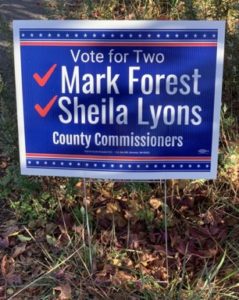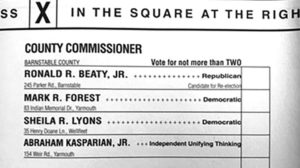PROVINCETOWN — It’s not easy sharing a ballot with the president. Presidential elections always hoover up the attention, even in a normal year, even when the contest is boring. This year is anything but boring — the Trump versus Biden race is expected to drive turnout to 100-year heights nationwide.
After that vote for president, though, there are choices across the rest of the ballot. For voters in the Outer Cape towns, there are three contests in particular whose outcome is uncertain: the county commissioners’ race, and the two statewide ballot questions.
Voters who feel they don’t know much about these races often skip them. To help get more information, the Independent talked to three of the candidates for county commissioner about themselves, their election, and the other contests on the ballot.
County Commissioner
The first thing to know about the county commissioners’ race: you have two votes. There are two seats up for election on the three-person commission, and each voter has the right to pick two candidates for those two seats.
This kind of contest has a long history of confusing voters. Voting twice in one race doesn’t come easy, and, in 2016, at least a third of Barnstable County voters didn’t vote for two candidates.
“There are four candidates running for two seats,” said Mark Forest of Yarmouth. “Sheila Lyons and I are the Democrats, and there are two strong supporters of Trump. One is the incumbent, Ron Beaty, and one is Abraham Kasparian, running as — apparently, you’re allowed to make up your own party in Massachusetts. He’s running as the Independent Unifying Thinking Party.”
“This is an opportunity, if you’re a Democrat,” said Lyons, who lives in Wellfleet. “There are two very good candidates. Mark and I are going to work together, and we are asking people to vote two and vote blue.”
Beaty, the Republican who was elected to the county commission in 2016, did not respond to an interview request from the Independent. He lives in Barnstable.
“I wanted to unify us as one people,” said Kasparian, who lives in Yarmouth. “That was part of my goal in running for office. I’m independent, and I’m thinking hard on all these issues. That’s how I came up with the name.”
Forest, Lyons, and Kasparian would bring very different experiences to the commission.

Lyons served two terms as a county commissioner, from 2008 to 2016, and currently works at Outer Cape Health Services as an access specialist, signing people up for health insurance.
Forest was the Cape and Islands district director for U.S. Rep. Gerry Studds, and served in the same role for his successor, Bill Delahunt. “I was the congressmen’s liaison to all the Cape and Islands communities,” said Forest. “From groundwater issues, to the National Seashore, the dune shacks, the fishing industry, shellfishing, wetlands restoration — I’ve worked on all of those.” Forest went on to be Delahunt’s chief of staff in Washington.
Kasparian was a real estate broker, and served on the Hampden County Commission in the late 1990s. He went to prison for 13 years in 2002 for attempting to murder his estranged wife in a pizza parlor.
“I learned a lot about myself, how I came to go to prison,” said Kasparian. “And also how to change yourself and become a better person. I did try to help other people inside. Because of my experience with contracts, I helped a lot of inmates with their civil suits. You try to be a positive force.”
Beaty, the incumbent, has also been to prison — in 1991, for sending death threats to then-President George H. W. Bush and Sen. Ted Kennedy. He was sentenced to 16 months.
Beaty’s election in 2016 was partly due to the pick-two election system. Barnstable County tends to vote about 55 percent for Democrats and 40 percent for Republicans. That year, 72,000 people voted for Hillary Clinton — but only 58 percent of that number voted for the two Democrats on the ballot in the county commission race.
Meanwhile, 54,000 in Barnstable County voted for Donald Trump in 2016.
The two top candidates win. In 2016, the top vote-getter was Democrat Mary Pat Flynn. But 23,000 people who voted for Democrats didn’t vote for two commissioner candidates. As a result, Beaty edged out Forest by 903 votes.
This is why Forest and Lyons appear to be campaigning for each other this year. “You want to use your two votes for the two Democrats, and not leave one behind,” Lyons said.
What Does the County Do?
The Independent asked the candidates to explain what Barnstable County government does.
“The county government can capture real estate taxes that would be going to the state’s general fund and keep that money here on the Cape,” said Lyons. “Then it can strategically look at issues that confront all the towns: wastewater, climate change, adapting and reinforcing the coastline, public health; a regional approach to housing.”
“The county has a dredge program that saves the towns millions every year,” said Forest. “There’s a collective purchasing program, a public health staff, a police academy, a fire training academy. The county grows the actual oyster seed for shellfishers. It’s invested in broadband infrastructure. These are things the 15 towns couldn’t do on their own.”
“My goal is to abolish county government if I become commissioner and return the $15 million in revenue it collects from real estate taxes to the 15 towns,” said Kasparian. “The Cape Cod Commission can do a lot of the important work. Also, I would like to see a unified beach sticker for all of the 15 towns, so if you live on the Cape, you can buy one sticker that’s good for every beach.”
Questions 1 and 2
Ballot Question 1 is a classic scrap between two large industries — more than $30 million has been spent on advertising by the two sides. The largest donors to the Yes campaign are auto repair chains like O’Reilly Auto Parts and AutoZone. The largest donors to the No campaign are the car companies themselves, including General Motors, Toyota, and Ford.
“It’s really the car manufacturers trying to capture all the repair business into their dealerships,” said Lyons. “Saying, ‘This data is so specialized, you have to come to us.’
“For people who want to support their local repair shops, you should vote yes,” Lyons said.

Question 2 is an election reform initiative called ranked choice voting (RCV). It would allow voters to pick all the candidates they like, in order, without having to worry they’re “wasting” their vote on someone who can’t win. If their first choice is far behind, their vote will be reallocated to one of their other preferred candidates.
In primary elections in particular, when there can be many similar candidates competing, RCV means that two similar candidates won’t crowd each other into defeat. A progressive voter wouldn’t have to choose between Sanders and Warren — she could essentially vote for both, without having to worry about who was more viable. A conservative voter could do the same with multiple conservative candidates.
In general elections, RCV ensures that the candidate who can appeal to the most voters wins — even in a three- or four-candidate race.
“It gives the voter more power and more choices,” said Lyons. Proponents argue that RCV enables more candidates to run without sabotaging their nearest kin. Green Party candidates can run without hurting Democrats, and Libertarians can run without hurting Republicans.
The Democratic and Libertarian parties of Massachusetts have endorsed Question 2, as have a long list of Democratic office holders. The Republican Party of Massachusetts is against it.



